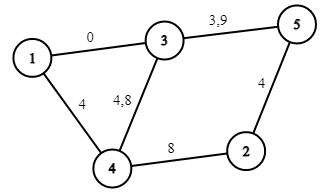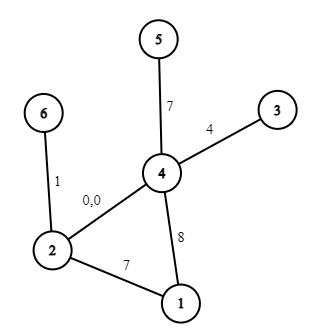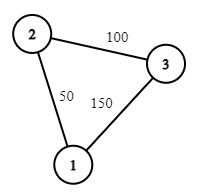You are given a connected weighted undirected graph, consisting of $$$n$$$ vertices and $$$m$$$ edges.
You are asked $$$k$$$ queries about it. Each query consists of a single integer $$$x$$$. For each query, you select a spanning tree in the graph. Let the weights of its edges be $$$w_1, w_2, \dots, w_{n-1}$$$. The cost of a spanning tree is $$$\sum \limits_{i=1}^{n-1} |w_i - x|$$$ (the sum of absolute differences between the weights and $$$x$$$). The answer to a query is the lowest cost of a spanning tree.
The queries are given in a compressed format. The first $$$p$$$ $$$(1 \le p \le k)$$$ queries $$$q_1, q_2, \dots, q_p$$$ are provided explicitly. For queries from $$$p+1$$$ to $$$k$$$, $$$q_j = (q_{j-1} \cdot a + b) \mod c$$$.
Print the xor of answers to all queries.
The first line contains two integers $$$n$$$ and $$$m$$$ ($$$2 \le n \le 50$$$; $$$n - 1 \le m \le 300$$$) — the number of vertices and the number of edges in the graph.
Each of the next $$$m$$$ lines contains a description of an undirected edge: three integers $$$v$$$, $$$u$$$ and $$$w$$$ ($$$1 \le v, u \le n$$$; $$$v \neq u$$$; $$$0 \le w \le 10^8$$$) — the vertices the edge connects and its weight. Note that there might be multiple edges between a pair of vertices. The edges form a connected graph.
The next line contains five integers $$$p, k, a, b$$$ and $$$c$$$ ($$$1 \le p \le 10^5$$$; $$$p \le k \le 10^7$$$; $$$0 \le a, b \le 10^8$$$; $$$1 \le c \le 10^8$$$) — the number of queries provided explicitly, the total number of queries and parameters to generate the queries.
The next line contains $$$p$$$ integers $$$q_1, q_2, \dots, q_p$$$ ($$$0 \le q_j < c$$$) — the first $$$p$$$ queries.
Print a single integer — the xor of answers to all queries.
5 8 4 1 4 3 1 0 3 5 3 2 5 4 3 4 8 4 3 4 4 2 8 5 3 9 3 11 1 1 10 0 1 2
4
6 7 2 4 0 5 4 7 2 4 0 2 1 7 2 6 1 3 4 4 1 4 8 4 10 3 3 7 3 0 2 1
5
3 3 1 2 50 2 3 100 1 3 150 1 10000000 0 0 100000000 75
164
The queries in the first example are $$$0, 1, 2, 3, 4, 5, 6, 7, 8, 9, 0$$$. The answers are $$$11, 9, 7, 3, 1, 5, 8, 7, 5, 7, 11$$$.

The queries in the second example are $$$3, 0, 2, 1, 6, 0, 3, 5, 4, 1$$$. The answers are $$$14, 19, 15, 16, 11, 19, 14, 12, 13, 16$$$.

The queries in the third example are $$$75, 0, 0, \dots$$$. The answers are $$$50, 150, 150, \dots$$$.

| Name |
|---|




